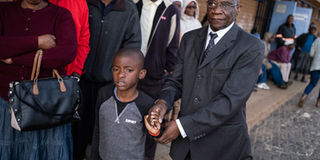Three party leaders battle it out in South Africa election

An 8-year old boy accompanies his blind grandfather to vote during the sixth general election at a polling station in Hitekani Primary School in Soweto, on May 8, 2019. AFP PHOTOS
What you need to know:
- Mmusi Maimane, 38, is the first black leader of the Democratic Alliance (DA), South Africa's main opposition party.
Raised in Soweto -- the heartland of the anti-apartheid struggle -- Maimane only joined the DA in 2009 and was fast-tracked through its ranks to take control in 2015. - Julius Malema, 38, is a former ANC youth leader who launched the Economic Freedom Fighters (EFF) party in 2013 and, against all the odds, has turned it into a political force.
Polls have opened in South Africa with the leaders of the three main parties vying for votes in a race that could test the ruling ANC's long-held dominance.
Here is a look at the three:
The shrewd president
Cyril Ramaphosa, the leader of the ruling ANC party, took the country's reins last year after a dramatic and varied career intertwined with the birth of modern South Africa.
He was a pioneering young trade union leader, an anti-apartheid activist, and a Nelson Mandela protege who led talks to end white-minority rule and helped write the new constitution.
When Mandela walked out of jail in 1990, Ramaphosa was standing beside him.
But after missing out on becoming Mandela's successor as president, Ramaphosa instead became a hugely wealthy businessman through stakes in McDonalds, Coca-Cola, mining and telecommunications, and developing a taste for breeding rare cattle.

Cyril Ramaphosa
In 2012, his image was badly tarnished when police killed 34 striking workers at the Marikana platinum mine, operated by London-listed Lonmin, where he was then a non-executive director.
Ramaphosa had called for a crackdown on the strikers, whom he accused of "dastardly criminal" behaviour.
He returned to politics to become Jacob Zuma's vice president in 2014, often drawing criticism for failing to speak out against corruption and government mismanagement.
Renowned for his patience and strategic thinking, Ramaphosa narrowly beat off pro-Zuma rivals to take over the leadership of the ANC in 2017 and then claim the presidency when Zuma was forced out last year.
Ramaphosa's support base crosses South Africa's racial and class divides, but he still faces strong opposition from factions within the ANC.
"This is a decisive moment in our country, in the history of South Africa, this is a moment when... we choose hope over despair," he told supporters at the ANC's final campaign rally.
Born in Johannesburg's Soweto township, Ramaphosa took up activism while studying law in the 1970s, and spent 11 months in solitary confinement in 1974.
The young opposition leader
Mmusi Maimane, 38, is the first black leader of the Democratic Alliance (DA), South Africa's main opposition party.
Raised in Soweto -- the heartland of the anti-apartheid struggle -- Maimane only joined the DA in 2009 and was fast-tracked through its ranks to take control in 2015.
His rapid promotion led to accusations that he was being used by the party's senior white activists to cover up a lack of reform within the party.

South African main opposition party Democratic Alliance (DA) leader Mmusi Maimane (R) leaves the ballot station after casting his vote for the general elections at the Presbyterian Church in Dobsonville, Johannesburg on May 8, 2019.
A gifted orator and smooth campaigner, he has kept the DA in the spotlight, broadened its appeal and held together its warring factions.
But he has struggled to land punches on Ramaphosa or to convince many black middle-class voters that the DA is not still a "white" party.
A devout Christian, he has a masters degree in Theology and regularly preaches at church, where he met his white wife Natalie.
Before getting into politics, Maimane ran his own management consultancy and lectured at a business school in Johannesburg.
His reserved leadership style could come under question if the DA fails to make significant gains on the 22 percent of the vote it got in the 2014 election.
The radical firebrand
Julius Malema, 38, is a former ANC youth leader who launched the Economic Freedom Fighters (EFF) party in 2013 and, against all the odds, has turned it into a political force.
He was kicked out of the ruling party after coming into conflict with the leadership but has thrived as a rebel, delivering fiery speeches spiced with jokes and digs at Ramaphosa, the ANC and South Africa's white minority.
Presenting himself as the voice of the young and unemployed, he demands the seizure of land from whites without compensation, and the nationalisation of mines and banks.

Julius Malema
His threat to the ANC was underlined last year when Ramaphosa adopted a tougher stance on land reform to appease a section of the electorate, spooking foreign investors.
Wearing a red beret and styling himself as "commander in chief", Malema hopes to ride a growing wave of discontent among the poorest of South Africans 25 years after the end of apartheid.
During Jacob Zuma's reign as president, he led his lawmakers in a campaign to disrupt parliament by chanting and heckling, before being thrown out by security officers.
His party holds 25 seats in the 400-member parliament.




